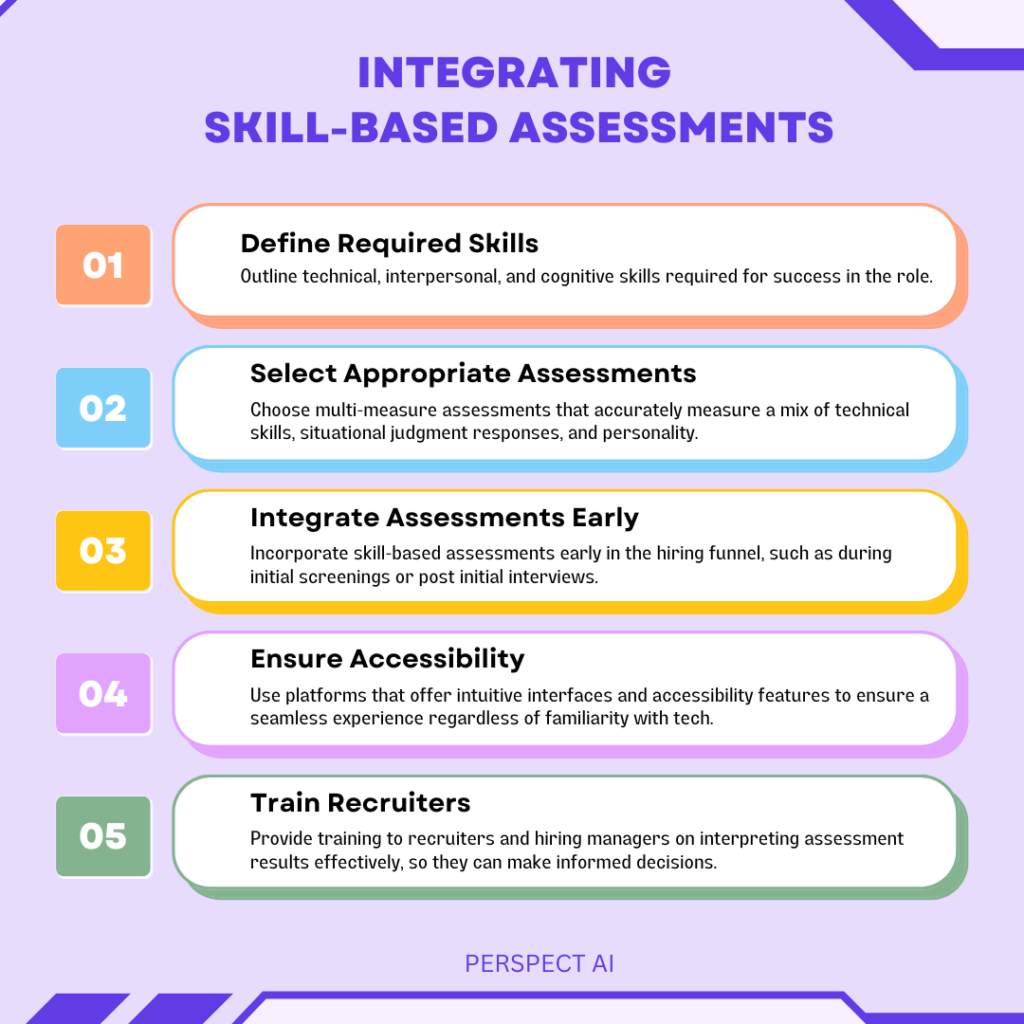The current world of work is characterized by high levels of dynamism with organizations always on the lookout for methods that can enable them to source and retain employees, especially young talent from campuses. Employment processes that are commonly used are often highly dependent on resumes and structured interviews, which are not enough. This is where skill based assessments come into the picture.

Skill-based assessments give a better and more realistic picture of a candidate. In India, this trend is gaining momentum across various sectors, including IT, healthcare, and finance, due to its ability to match businesses’ dynamic needs with the right talent. 50% of recruiters in India are already using skills to search for candidates.
A survey also revealed that 76% of employers see skills-based hiring as a gateway to accessing a richer talent pool.
What are Skill Based Assessments?
Ability tests are developed for the purpose of rating the proficiency of the candidate in a certain task. They do not involve the use of proxy variables such as previous academic records. This approach has several significant advantages:
- Identifying True Potential: In contrast to typical approaches, the results of skill-based assessments are closer to the real candidate’s skills. For instance, a candidate who may not have excellent grades but very good in solving problems, may not even be considered in normal employment tests and interviews, but may be greatly distinguished in a competency based test.
- Objective Evaluation: These assessments reduce biases that are likely to prevail in the interview and resume evaluation processes. Thus, if words are replaced by actual skills, the appropriate level of selection can be reached without bias.
- Enhanced Job Fit: Traditional testing can be used to assess a person’s performance depending on the job opening. this is useful when identifying the right people for the right jobs thus enhancing productivity due to satisfaction and reduced turnovers.
The results from a Harvard Business Review study reveal that firms that incorporate skill-based assessments experience a 24% enhancement in the competency of their hiring process.
- Data-Driven Decisions: These assessments yield useful information in the hiring process and thus these serve as the findings of this study. Hiring managers can look at the results and decide how best to match the candidates to the jobs given their weaknesses and strengths.
Game-Based Assessments to Measure Skills
One of the most revolutionary kinds of assessment is the use of game elements in skill-based assessments. Companies like PerspectAI are at the beck and call of this revolution where they design games that help in assessing candidates’ capabilities. This approach offers several unique benefits:
- Engagement and Experience: The subjects being games, this way makes the assessment process more enjoyable than when one is faced with dull and repetitive tests. The game-based assessments by PerspectAI breaks the old traditional method of assessments into more exotic experiences making a company’s branding more meaningful and capturing the best talents.
A study done by TalentLMS showed that 79% of the participants agreed that when the learning or assessment process was gamified, motivation and productivity increased.
- Real-Time Skill Evaluation: PerspectAI’s evaluations test numerous competencies in real time which it organizes into categories of strategy, flexibility, and collaboration.
- Natural Behaviour Observation: Most of the conventional methods of assessments tend to place the candidates in awkward scenarios, thus facing pressure and tend to utter words that may not be natural. It is an advantage because PerspectAI’s game-based assessments mimic how people behave and respond making for a more realistic evaluation of the candidate’s abilities.
- Scalability and Efficiency: PerspectAI’s platform is perfect for campus programs where companies may have to screen hundreds, if not thousands of candidates at a time. The scalability also means that every candidate is given a levelled playing ground and is given an equal chance to showcase his or her talent.
Of all, the success story of Unilever’s employment tests is apparent proof that game-based assessments work. Unilever even radicalized the selection method and implemented a series of games that would help to determine candidates’ cognitive, emotional and social skills.
A report by the National Bureau of Economic Research found that employees hired based on skills rather than qualifications showed a 30% improvement in job performance.
Types of Skill Based Assessments
- Technical Skill Assessments: These assessments measure a candidate’s proficiency in specific technical areas relevant to the job, such as coding tests for software developers or simulations for engineers.
- Interpersonal Skill Assessments: These evaluations focus on a candidate’s soft skills, such as communication, teamwork, and leadership abilities. They are crucial for roles that require collaboration and interaction with others, ensuring that candidates can work well within a team and manage relationships effectively.
- Cognitive and Problem-Solving Assessments: These tests measure a candidate’s analytical thinking, problem-solving capabilities, and ability to learn new concepts. Such assessments are valuable for roles that require critical thinking and adaptability, ensuring that candidates can handle complex problems and dynamic environments.
- Behavioral Assessments: These assessments evaluate a candidate’s personality traits, work style, and cultural fit within an organization. They help predict how a candidate will behave in various work situations and whether their values align with the company’s culture.
Implementing Skill Based Assessments in Campus Hiring

Skill-based assessments are transforming campus hiring by offering a more holistic approach to evaluating candidates beyond traditional methods. Here’s how companies can effectively integrate these assessments into their hiring process to identify top talent:
- Define Required Skills: Start by clearly outlining the technical, interpersonal, and cognitive skills necessary for success in the role. This ensures that assessments are aligned with the specific job requirements.
- Select Appropriate Assessments: Choose assessments that accurately measure the identified skills. Consider using a mix of technical tests, situational judgment tests, and personality assessments to get a comprehensive view of each candidate.
- Integrate Assessments Early: Incorporate skill-based assessments early in the hiring funnel, such as during initial screenings or post-initial interviews. This allows you to filter out candidates who don’t meet the skill requirements early on, saving time for both candidates and recruiters.
- Ensure Accessibility and User-Friendliness: Use platforms like PerspectAI that offer intuitive interfaces and accessibility features to ensure a seamless experience for all candidates, regardless of their background or familiarity with technology.
- Train Recruiters: Provide training to recruiters and hiring managers on interpreting assessment results effectively. This equips them to make informed decisions based on candidates’ skill profiles and ensures consistency in evaluation.
Some Best Practices for Effective Implementation
- Communicate Transparently: Inform candidates about the assessment process upfront. Clearly explain the purpose of assessments, how they will be used in the hiring decision, and the skills being evaluated.
- Maintain Fairness and Objectivity: Design skill based assessments that are fair and unbiased, free from cultural or gender biases. Use validated tools and standardized scoring methods to ensure objectivity in evaluation.
- Use Data Analytics: Leverage data analytics to analyze assessment results and identify patterns among successful hires. This helps refine assessment criteria and improve the predictive validity of the hiring process over time.
- Provide Feedback: Offer constructive feedback to candidates based on their assessment performance. This not only enhances candidate experience but also helps them understand areas for improvement.
- Iterate and Improve: Continuously review and refine your assessment strategy based on feedback from candidates, recruiters, and hiring outcomes. Adapt assessments to evolving job requirements and industry trends.
Implementing skill based assessments in campus hiring not only enhances the quality of hires but also fosters a more efficient and equitable recruitment process. By integrating these assessments strategically and following best practices, companies can identify and attract candidates who possess the right mix of skills and potential to drive organizational success.